

East Keilor Community Garden. Environmental Education in Botanic Gardens: Exploring Brooklyn Botanic Garden's Project Green Reach: The Journal of Environmental Education: Vol 40, No 4. Brooklyn Community Gardens. Deakin University. Pursuit by The University of Melbourne. By Julianna Rozek, Master of Science (Botany), University of Melbourne City slickers are going back to their agricultural roots in community gardens, pop-up veggie patches and roadside planters, which are sprouting up all over Melbourne.
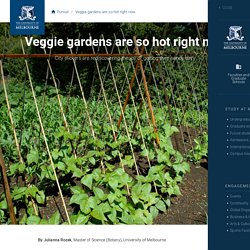
University of Melbourne students are exploring this phenomenon by building and tending their own veggie plots at the University’s Burnley Campus. Master of Science in Botany student Julianna Rozek writes about her experience and the wider urban garden movement. Getting our hands dirty In the first week of March I arrived in Burnley with a diverse group of Masters students to a bare, freshly ploughed field. This was our introduction to Food Production for Urban Landscapes, a new subject coordinated by Dr Chris Williams, Lecturer in Urban Horticulture at the University of Melbourne. We planted broccoli, tomatoes, silverbeet and beans, and also Oca - a delicious root vegetable from the Andes and one of the “lost crops of the Incas”.
Embracing the trend. Melbourne’s community gardens could save the city’s foodbowls. Like many parents, Christine Murray struggled to get her three children to eat their vegies.
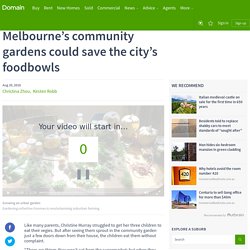
But after seeing them sprout in the community garden just a few doors down from their house, the children eat them without complaint. “There are things they won’t eat from the supermarket; but when they watch it grow, they want to see what it tastes like,” the kindergarten educator said. The family bought into the new housing estate of Katandra Rise in Doreen two years ago and are part of a growing trend of Melburnians who produce their own food. Katandra Rise residents Georgia Ramsey and Christine Murray with their children, Lyla ,Isla , Rhys, Arley and Jensen, love eating the food they produce in the community garden.
Photo: Pat Scala From large-scale community collectives to the humble backyard vegie patch, Melbourne’s plot culture has gained considerable traction in the past decade, with more and more people discovering the humble pleasure of GIY (grow-it-yourself). Creative Collectives Australia – School of Self-Sufficiency – Workshops – Collective Culture Directory – Community Living Network – Wolf Pack – Rewilding. Community gardening planning documents. Northwest Disability Services. Munity Gardens: The Great Benefits Of Joining One. If you've ever driven or walked by a lush green garden sitting in the middle of a park or neighbourhood (and looked in awe at its fresh tomatoes and lettuce), it's probably one of many community gardens in your local city or town.
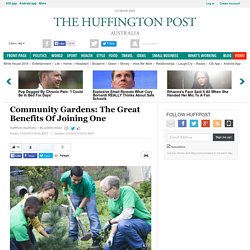
Community gardens might seem like a secret club that no one else can be part of, but joining a community is easy and a great way to meet people, grow your own fresh produce and learn about gardening. “Community gardens have become a real interest for the neighbourhood community,” Manager of City of Sydney greening and leisure Joel Johnson told The Huffington Post Australia.
“People join for different reasons. A lot of times it’s about growing fresh food and having a local space. For others it’s about the real social network that develops around these community gardens. Directory, Data & Mapping. Resources – Farm to College. Below are many recommended resources and Web sites to help you start or expand a farm-to-college project.
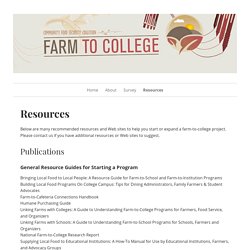
Please contact us if you have additional resources or Web sites to suggest. Publications General Resource Guides for Starting a Program. Community Food Security Coalition - Programs - Farm to College. Click below to jump to the following sections: For extensive information on farm to college projects around the country and other valuable resources and information, go to the Official Farm to College Website Farm to College Projects - Is There a Need?
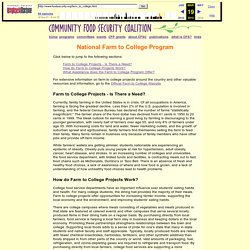
Currently, family farming in the United States is in crisis. Of all occupations in America, farming is facing the greatest decline. Less than 2% of the U.S. population is involved in farming, and the federal Census Bureau has declared the number of farms "statistically insignificant. " While farmers' wallets are getting slimmer, students nationwide are experiencing an epidemic of obesity. How do Farm to College Projects Work? College food service departments have an important influence over students' eating habits and health. The consumption of local foods and the awareness of the benefits of a vegetarian diet or a low-fat diet are on the rise amongst students. What Assistance does the Farm to College Program Offer? Farm to College Website. Fighting Food Insecurity on Campus - Higher Education Today. CUFBA — College and University Food Bank Alliance. DeakinCommunity Garden - Home. Melbourne University Community Garden.
Monash University Community Farm. Curtin Student Garden Curtin University of Technology. Students Representative Council, Sydney University » Amelie Vanderstock updates us on the USYD community garden project. A community garden is growing at USYD!

After years of spontaneously arising groups, writing proposals, pressuring the university, and creating guerrilla garden plots around campus to spread the word, a community garden will soon be growing at USYD. Operating through the Student Representative Council (SRC), in a joint venture with the Centre for English Teaching (CET) and the USYD Food Coop, we can now create an inclusive space where students are empowered to come together- learning from one another through building and maintaining our campus garden.
We’ve received the final approval to begin construction of raised garden beds on the 5th floor Balcony of Wentworth building. Community gardens a way of the future. Community gardens not only provide sustainable living and food security, they also create a much needed sense of belonging, a Murdoch University student found out on her recent trip to Cuba and North America.
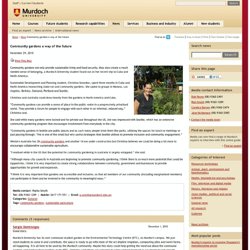
Sustainable Development and Planning student, Christina Snowdon, spent three months in Cuba and North America researching state-run and community gardens. She spoke to groups in Havana, Los Angeles, Berkley, Oakland, Portland and Seattle. Community Garden - Campus Environment @ UOW. UOW has a vegetable garden at the Wollongong Campus in the Building 25 courtyard and patio.
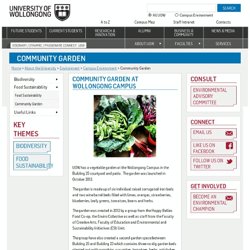
The garden was launched in October 2012. The garden is made up of six individual raised corrugated iron beds and two wine barrel beds filled with limes, oranges, strawberries, blueberries, leafy greens, tomatoes, beans and herbs. The garden was created in 2012 by a group from the Happy Bellies Food Co-op, the Enviro Collective as well as staff from the Faculty of Creative Arts, Faculty of Education and Environmental and Sustainability Initiatives (ESI) Unit. The group have also created a second garden space between Building 25 and Building 23 which contains three no-dig garden beds planted out with pumpkins, cucumber, tomatoes, herbs, artichokes, beetroot, mint and chives. More than 'just a garden': towards a UQ community garden - Development Practice. The St Lucia campus of The University of Queensland (UQ) is renowned for many things, including its extensive park-like grounds and stately Jacaranda trees, but not often its ability to produce food.
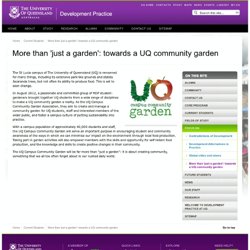
This is set to soon change. In August 2012, a passionate and committed group of MDP student-gardeners brought together UQ students from a wide range of disciplines to make a UQ community garden a reality. As the UQ Campus Community Garden Association, they aim to create and manage a community garden for UQ students, staff and interested members of the wider public, and foster a campus culture of putting sustainability into practice. With a campus population of approximately 40,000 students and staff, the UQ Campus Community Garden will serve an important purpose in encouraging student and community awareness of the ways in which we can minimise our impact on the environment through local food production.
The U Community Garden / Sustainability / Our University / About UoN. Flinders University Community Permaculture Garden South Australia. Flinders University Community Permaculture Garden South Australia Introduction to the Community Garden The Flinders University Community Garden was established in 2001 by friends of the Flinders Environment Action Group (FEAG), and in 2011 will celebrate its ten year anniversary.
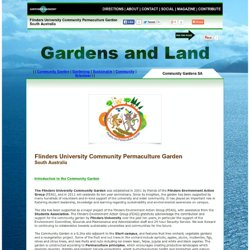
Community garden located at Charles Darwin University Casuarina Campus on a two acre site on Lakeside Drive in Alawa. Community garden, Sustainability, La Trobe University. Join our community gardens Get involved in weeding, mulching, composting, planting and grow your own veggies! This is a great way to learn new skills and meet new friends. Gardening sessions are open to all staff and students. Community Garden. Plots are available, come on down to start your own veggie or flower garden today. Students, staff and community members are welcome.
Students pat a small one-time fee of $5 to cover the cost of water and receive their very own plot for planting. The community garden teaches and promotes organic growing practices. In addition, the garden also accepts up to 120kg of food waste from the Campus Engagement kitchens each week for composting. How does it work? Members receive access to the garden during daylight hours 7 days a week Meetings and Working Bees are held on the first Sunday of each month at 4.00PM Where is it? The Community Garden is now located at the northwestern corner of Culloden and Talavera Roads (adjacent to the road that leads into the University Sports Fields) Sign up. Creative Collectives Australia – School of Self-Sufficiency – Workshops – Collective Culture Directory – Community Living Network – Wolf Pack – Rewilding.